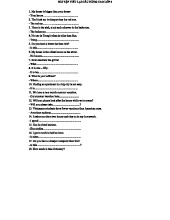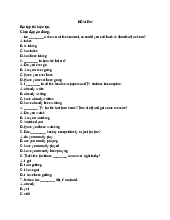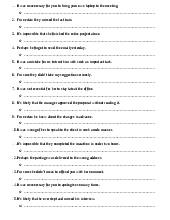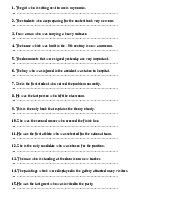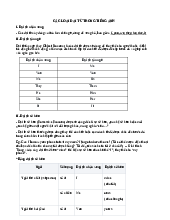















Preview text:
Đề cương ôn tập học kì 1 môn Tiếng Anh 6 sách Chân trời sáng tạo
Nội dung ôn tập học kì 1 môn Tiếng Anh 6 - Friends Plus 1. Comparison
So sánh hơn của tính từ ngắn: adj + -er + (than) Ví dụ:
- Bikes are slower than cars. (Xe đạp chậm hơn ô tô.)
- It has been quieter here since my dog went missing. (Chỗ này trở nên
yên tĩnh hơn kể từ khi con chó của tôi bị lạc.)
So sánh cao nhất của tính từ ngắn: the adj + -est + (N) Ví dụ:
- Bikes are the slowest of the three vehicles. (Xe đạp là chậm nhất trong số ba phương tiện.)
- My village is the quietest place in the province. (Làng tôi là nơi yên tĩnh nhất của tỉnh.)
Quy tắc thêm –er và –est vào sau tính từ ngắn trong so sánh hơn và so sánh cao nhất
- Phần lớn các tính từ ngắn: thêm –er hoặc –est (fast – faster – the fastest)
- Tính từ kết thúc bằng –y: bỏ –y, và thêm –ier hoặc –iest (happy – happier – the happiest)
- Tính từ kết thúc bằng –e: thêm –r hoặc –st (simple – simpler – the simplest)
- Tính từ kết thúc bằng một nguyên âm và một phụ âm: gấp đôi phụ âm
cuối rồi sau đó mới thêm –er hoặc –est (thin – thinner – the thinnest)
So sánh hơn của tính từ dài: more + adj + (than) Ví dụ:
- A lion is more dangerous than an elephant. (Sư tử nguy hiểm hơn voi.)
- The bus fare is more expensive this year. (Giá vé xe buýt năm nay đắt hơn.)
So sánh cao nhất của tính từ dài: the most + adj + (N) Ví dụ:
- The lion is the most dangerous animal of the three. (Sư tử là loài nguy
hiểm nhất trong ba loài này.)
- The brown dress is the most expensive. (Chiếc váy màu nâu là đắt nhất.)
Các dạng so sánh hơn và so sánh cao nhất của một số tính từ đặc biệt
good - better - the best bad - worse - the worst
many, much - more - the most
little - less - the least
far - farther, further - the farthest, the furthest 2. The present tense a. To Be: (am/ is/ are) Khẳng
Phủ định Nghi vấn? định (not) I Am Am not Am I …………? He/ She/ It/ Danh từ Is not Is Is……he/she…………. ? số ít (isn’t) You/ We/ They/ Are not Are Are …………. ? Danh từ số nhiều (aren’t) b. Ordinary verbs: Khẳng Phủ định Nghi vấn? định (not) Vo I/ You/ We/ They/ Danh từ Do not + Vo Do…. + Vo…? số nhiều (nguyên (=don’t +Vo) mẫu) Does not + Vo Does…. +
He/ She/ It/ Danh từ số ít Vs/es (=doesn’t Vo…? +Vo)
* Use: Diễn tả một sự thật ở hiên tại, một quy luật, một chân lý hiển nhiên
Diễn tả một thói quen,môt sự việc lập đi lập lại ở hiện tại, một phong tục.
* Note:Trong thời hiện tại thường, các ngôi (thứ nhất số ít/nhiều, thứ 3 số
nhiều) được chia như ví dụ tổng quát 1/ trên đây, riêng ngôi thứ 3 (ba) số
ít (He, she, it - Tom, John, Hoa . .), ta cần lưu ý các quy tắc sau:
- Phải thêm "s" vào sau động từ ở câu khẳng định. (V+s)
Ví dụ: He likes reading books. She likes pop music.
- Câu phủ định :…………………………………….
- Câu nghi vấn? :…………………………………….
- Ngoài việc "s" vào sau động từ, ta phải đặc biệt chú ý những trường hợp sau:
+ Những động từ (Verbs) tận cùng bằng những chữ sau đây thì phải thêm "ES".
S, X, Z, CH, SH, O (do, go) + ES Ví dụ: miss misses mix buzz watch wash do go
Ví dụ: He often kisses his wife before going to work.
Tom brushes his teeth everyday.
Những động từ (Verbs) tận cùng bằng "Y" thì phải xét hai (2) trường hợp sau đây.
Nếu trước Y là nguyên âm (vowel)…………. thì giữ nguyên y và chỉ thêm S
Ví dụ: She plays the piano very well.
Nếu trước Y là phụ âm (consonant) thì sẽ chia như sau: (Y ---- IES) We carry She/ he carries They worry She/ he worries
Ví dụ: He often carries money with him whenever he goes out.
Các trạng từ dùng trong thời Hiện tại đơn:
- Always, usually, often, not often, sometimes, occasionally, never;
- Everyday, every week/ month/ year. ., on Mondays, Tuesdays, . . , Sundays.
- Once/twice/ three times. . a week/month/y ear . .;
- Every two weeks, every three months (a quarter)
- Whenever, every time, every now and then, every now and again, every so often
Cách phát âm: Với các ngôi thứ ba (3) số ít, đuôi "S" được đọc như sau: Cách đọc
Các động từ có kết thúc với đuôi /s/ F, K, P, T /iz/ S, X, Z, CH, SH, CE, GE + ES /z/
Không thuộc hai loại trên
3. The present continuous Form VERB AFFIRMATIVE FORM S + BE + V-ING NEGATIVE FORM S + BE + NOT + V-ING INTERROGATIVE FORM BE + S + V-ING …? SHORT ANSWERS YES, S + BE NO, S + BE + NOT Usage
a) Diễn tả hành động, sự việc xảy ra ngay tại thời điểm nói. Ex: Where's Mary? She's having a bath.
b) Diễn tả một hành động đang xảy ra và kéo dài một thời gian ở hiện tại. Ex: What are you doing now? I am cooking.
c) Diễn tả một tình huống tạm thời
Ex: I'm living with some friends until I find a flat.
The telephone isn't working this morning.
d) Diễn tả những tình huống đang tiến triển, đang thay đổi (dù kéo dài)
Ex: That child is getting bigger every day.
e) Diễn tả những sự việc xảy ra trong khoảng thời gian gần lúc nói (ví
dụ như: hôm nay, tuần này, tối nay. .) Ex: You're working hard today.
f) Diễn tả những việc đã sắp xếp để thực hiện, có dự định trước
(thường mang tính cá nhân) và trong câu có phó từ chỉ thời gian đi kèm.
Ex: A: What are you doing on Saturday evening? B: I am going to the theatre.
g) Hiện tại tiếp diễn với những động từ chỉ sự hy vọng, mong đợi
(dùng thay cho thì hiện tại đơn trong thư tín, lời mời)
Ex: We are looking forward to seeing you. I'm hoping to see you soon. Note:
Cách thêm "ING" sau động từ:
a) Động từ tận cùng bằng "e" (e câm) thì bỏ e trước khi thêm "ing" Ex: live - living come - coming Riêng tobe - being
b) Động từ 1 âm tiết (hoặc 2 âm tiết trở lên mà có âm nhấn ở cuối)
tận cùng bằng 1 phụ âm, có 1 nguyên âm đi trước thì ta nhân đôi phụ
âm tận cùng trước khi thêm "ing" Ex: run - running begin - beginning
Nhưng: meet - meeting (không gấp đôi t vì có 2 Nguyên âm " e" đi trước)
c) Động từ tận cùng bằng "ie" thì đổi thành "y" rồi thêm "ing" Ex: lie - lying die - dying
d) Động từ tận cùng bằng "L" mà trước nó là 1 nguyên âm đơn thì ta
cũng nhân đôi "L" rồi thêm "ing" Ex: travel - travelling gravel - gravelling
Thường dùng với các từ/cụm từ chỉ thời gian như:
Now, right now, at the moment (lúc này) At present (hiện nay) at the moment/ this time
listen!/ look!/ (!)/ pay attention to!/ hurry up! do you hear? keep silent ! = Be quiet!
don't make noise! = don't talk in class! today/ this day/ this Monday . WHERE + BE + S ? . . .
Những động từ không chia ở thì hiện tại tiếp diễn know wish expect understand wonder notice fall smell agree keep seem love/ like be fell start /begin want need look see consider taste hear feel finish have to prefer stop hope sound enjoy
Bài tập ôn thi học kì 1 môn Tiếng Anh 6
Exercise 1. Choose the correct form of the verb in Present continuous.
1. I ____________ (learn) how to swim.
2. I ____________ (eat) my lunch.
3. I ____________ (watch) television.
4. She ____________ (read) a book.
5. Dad ____________ (bake) a cake.
6. My sister ____________ (listen) to music.
7. Peter ____________ (clean) his car.
8. The dog ____________ (bark) in the garden.
9. We ____________ (sing) our favourite song.
10. My brother and I ____________ (play) a computer game.
11. The teachers ____________ (show) us a film.
12. They ____________ (bring) a TV in the classroom.
13. She's bored. Her friend ____________ (watch) TV again.
14. Martin's excited. Chelsea ____________ (win) the match.
15. I'm scared. A big dog ____________ (stand) in front of me.
16. She's happy. She ____________ (not work) today.
17. I'm worried. It ____________ (rain) and I haven't got an umbrella.
18. The teacher is annoyed. We ____________ (not listen).
19. What ____________ you ____________ (wait) for? I'm ____________ (wait) for John.
20. ____________ it ____________ (snow)? No, it ____________ (rain).
21. What ____________ you ____________ (do) today? We ____________ (go) to the park.
22. ____________ you ____________ (listen) to me? No, I
____________ (listen) to the radio.
23. ____________ you ____________ (watch) TV? No, we ____________ (study).
24. What ____________ you ____________ (do)? I ____________ (do) my homework.
25. ____________ they ____________ (sleep)? Yes, they are.
Exercise 2. Choose the correct form of the verb in simple present tense.
1) Dennis (cook) ___________________ on Wednesday.
2) Mariella and I (cook) ______________________ on Tuesday.
3) Spencer (wash) _______________________ his car on Sunday.
4) Tammy and I (wash) _____________________ our car on Monday.
5) You (study) _______________________ science on Thursday.
6) Thomas (study) ______________________ math on Friday.
7) Rickie (play) ___________________________ golf and tennis.
8) Justin and I (play) _______________________ basketball and soccer.
9) Kim (read) __________________________ fiction novels.
10) Richard and David (read) _____________________________ the newspaper.
Exercise 3: Put DO or DOES into the fol owing sentences to make questions
1. …………. ……the students study hard every day?
2…………….…Mr. Brown go to his office every day?
3. ………………. you want cream and sugar in your coffee??
4. ……………. …the children go to bed very early?
5. ………………. .that girl come from South Africa?
6. ………………you know that Italian student?
7. ……………. Miss Lan prefer coffee to tea?
8. ………………. your English lessons seem very difficult?
Exercise 4. Rewrite the sentences of comparison.
1. Her old house is bigger than her new one.
Her new house ___________________________
2. No one in my class is taller than Peter.
Peter ___________________________
3. The black dress is more expensive than the white one.
The white dress ___________________________
4. According to me, English is easier than Maths.
According to me, Maths ___________________________
5. No one in my group is more intelligent than Mary.
Mary ___________________________
6. No river in the world is longer than the Nile.
The Nile ___________________________
7. Mount Everest is the highest mountain in the world.
No mountain ___________________________
8. This is the first time I have ever met such a pretty girl,
She is ___________________________
9. He works much. He feels tired.
The more ___________________________
10. This computer works better than that one.
That computer ___________________________
Đáp án bài tập ôn thi học kì 1 môn Tiếng Anh 6
Exercise 1. Choose the correct form of the verb in Present continuous.
1 - am learning; 2 - am eating; 3 - am watching; 4 - is reading; 5 - is baking;
6 - is listening; 7 - is cleaning; 8 - is barking; 9 - is singing; 10 - are playing;
11 - are showing; 12 - are bringing; 13 - is watching; 14 - is winning; 15 - is standing;
16 - isn't working; 17 - is raining; 18 - aren't listening; 19 - are . . waiting - waiting;
20 - Is. snowing - is raining; 21 - are . . doing - are going; 22 - Are . . listening - am listening;
23 - are . . watching - are studying; 24 - are you doing - am doing; 25 - Are . . sleeping;
Exercise 2. Choose the correct form of the verb in simple present tense.
1) Dennis (cook) ______cooks___ on Wednesday.
2) Mariella and I (cook) _____cook_______ on Tuesday.
3) Spencer (wash) ___________washes____________ his car on Sunday.
4) Tammy and I (wash) _______wash____ our car on Monday.
5) You (study) ________study_______ science on Thursday.
6) Thomas (study) ______studies______ math on Friday.
7) Rickie (play) ________plays______ golf and tennis.
8) Justin and I (play) _______play____ basketball and soccer.
9) Kim (read) _________reads_____ fiction novels.
10) Richard and David (read) _________read______ the newspaper.
Exercise 3: Put DO or DOES into the fol owing sentences to make questions
1. …………Do. ……the students study hard every day?
2………Does…….…Mr. Brown go to his office every day?
3. …………Do……. you want cream and sugar in your coffee??
4. ………Do……. …the children go to bed very early?
5. …………Does……. .that girl come from South Africa?
6. ………Do………you know that Italian student?
7. ………Does……. Miss Lan prefer coffee to tea?
8. ………Do………. your English lessons seem very difficult?
Exercise 4. Rewrite the sentences of comparison.
1. Her old house is bigger than her new one.
Her new house _____isn’t so/ as big as her old one._______
2. No one in my class is taller than Peter.
Peter _____is the tallest in my class.________
3. The black dress is more expensive than the white one.
The white dress ________is cheaper than the black one./ isn’t so/ as
expensive as the black one. __________
4. According to me, English is easier than Maths.
According to me, Maths ____ isn’t so/ as easy as English/ is more difficult than English._____
5. No one in my group is more intelligent than Mary.
Mary _____is the most intelligent in my group._____
6. No river in the world is longer than the Nile.
The Nile _____is the longest river in the world._____
7. Mount Everest is the highest mountain in the world.
No mountain _______in the world is higher than Mount Everest.______
8. This is the first time I have ever met such a pretty girl,
She is ______the prettiest girl I have ever met.________
9. He works much. He feels tired.
The more ______he works, the more tired he feels.______
10. This computer works better than that one.
That computer ___doesn’t work so/ as well as that one._______
Document Outline
- Đề cương ôn tập học kì 1 môn Tiếng Anh 6 sách Chân
- Nội dung ôn tập học kì 1 môn Tiếng Anh 6 - Friends
- Bài tập ôn thi học kì 1 môn Tiếng Anh 6
- Đáp án bài tập ôn thi học kì 1 môn Tiếng Anh 6
